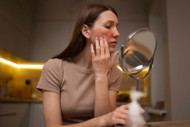10 Vitamin B12 Deficiency Symptoms that Appear on the Skin
Vitamins play a crucial role in maintaining overall health, and Vitamin B12 is no exception. This essential nutrient is vital for various bodily functions, including nerve function, red blood cell formation, and DNA synthesis. While Vitamin B12 deficiency can manifest in various ways, one often overlooked aspect is its impact on the skin. In this blog, we will explore 10 Vitamin B12 deficiency symptoms that may leave their mark on your skin, serving as visible indicators of an underlying nutritional imbalance.
Vitamin B12 Deficiency Symptoms that Appear on the Skin
Pale or Jaundiced Skin:
Vitamin B12 plays a crucial role in the synthesis of red blood cells. When the body lacks an adequate supply of Vitamin B12, red blood cell production decreases, leading to a condition known as anaemia. Anaemia is characterized by a reduced capacity of the blood to carry oxygen to various tissues and organs. The skin, being one of the most visible organs, reflects this lack of oxygen by appearing pale or even jaundiced. Jaundice, a yellowish discolouration of the skin, results from the accumulation of bilirubin, a yellow pigment formed during the breakdown of red blood cells.
Hyperpigmentation:
On the contrary, some individuals with Vitamin B12 deficiency may experience hyperpigmentation, a condition characterized by the darkening of certain areas of the skin. This occurs due to the disruption of melanin production, the pigment responsible for the colour of the skin, hair, and eyes. Without sufficient Vitamin B12, melanin synthesis may be altered, leading to irregular pigmentation and the appearance of darker patches on the skin.
Skin Lesions and Rashes:
Vitamin B12 deficiency can compromise the immune system and skin barrier function. This vulnerability makes the skin more prone to various lesions and rashes. These skin manifestations may present as red, itchy, or inflamed patches, emphasising the crucial role of Vitamin B12 in maintaining healthy skin and supporting the body's defence against external irritants.
Acne and Breakouts:
While the exact relationship between Vitamin B12 and acne is not fully understood, there is evidence suggesting that imbalances in B vitamins, including B12, may contribute to the development of acne. It is believed that B12 plays a role in regulating skin bacteria, and a deficiency might upset this delicate balance, potentially leading to acne and breakouts.
Angular Cheilitis:
Angular cheilitis involves the development of painful cracks or sores at the corners of the mouth. This condition is associated with Vitamin B12 deficiency, underscoring the importance of proper nutrition for oral health. B12 deficiency can affect the integrity of the oral mucosa, leading to discomfort and susceptibility to infections in this sensitive area.
Brittle Nails:
The health of nails is closely linked to overall well-being, and Vitamin B12 deficiency can manifest in the nails. Brittle, ridged, or discoloured nails may be indicative of issues with the synthesis of keratin, a protein crucial for nail strength. Adequate levels of Vitamin B12 are essential for maintaining the integrity and appearance of nails.
Hair Changes:
Vitamin B12 deficiency can impact the health and vitality of hair. Changes such as premature greying, hair thinning, or even hair loss may be observed in individuals with insufficient B12 levels. Adequate B12 is essential for the proper nourishment of hair follicles and the maintenance of healthy, vibrant hair.
Pruritus (Itching):
Itching, or pruritus, is a common symptom associated with Vitamin B12 deficiency. While the exact mechanisms are not fully understood, it is believed to be related to the impact of B12 on nerve function and skin health. The deficiency may lead to sensory disturbances that result in persistent itching.
Eczema and Psoriasis Flare-ups:
Individuals with Vitamin B12 deficiency may experience an increased susceptibility to flare-ups of chronic skin conditions such as eczema and psoriasis. Proper B12 levels are crucial for modulating the immune response and maintaining skin barrier function, both of which are essential in managing and preventing these skin issues.
Skin Ulcers:
In severe cases of Vitamin B12 deficiency, the skin may develop ulcers, particularly in areas subject to pressure or trauma. The compromised integrity of the skin, coupled with impaired wound healing, can result in painful and slow-to-heal ulcers. This highlights the urgency of addressing B12 deficiency promptly to prevent severe complications.
Treating Vitamin B12 Deficiency
Addressing the symptoms of vitamin B12 deficiency evident on your skin can involve various treatments, but it's crucial to address the root causes naturally. Opting for natural approaches is the most effective solution.
Vitamin B12 is predominantly present in animal products, making it a challenge to attain sufficient levels through a vegetarian or vegan diet. However, there are organic and natural methods to boost Vitamin B12 in your system. This includes incorporating fortified plant-based foods, nutritional yeast, a variety of mushrooms, and whole grains and legumes into your diet. Additionally, organic vegan Vitamin B12 supplements can be considered to meet your Vitamin B12 requirements.
While direct sunlight exposure doesn't provide Vitamin B12, it can stimulate its production in the skin. Spending time outdoors ensures ample sunlight exposure, but it's essential to practice sun safety to prevent potential skin damage.
Conclusion
Your skin, being the body's largest organ, can often serve as a visible canvas reflecting internal health. Vitamin B12 deficiency is a serious concern with a wide range of symptoms, some of which are prominently displayed on the skin. Recognizing these signs is crucial for timely intervention and ensuring that your skin remains a vibrant reflection of your overall well-being. If you are diagnosed with a Vitamin B12 deficiency, incorporate the necessary dietary changes or natural supplements to address the deficiency and promote optimal skin health. Additionally, consider embracing a holistic approach to natural skincare, incorporating nutrient-rich foods and health supplements for comprehensive well-being.
 SGD
SGD

















